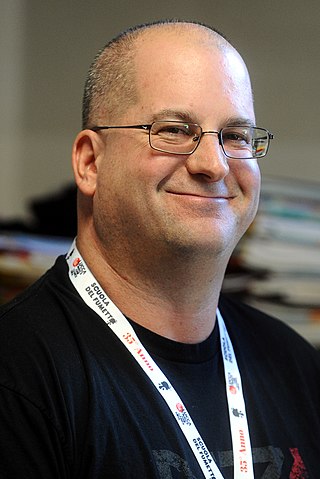
Drew Karpyshyn is a Canadian video game scenario writer, scriptwriter and novelist of Ukrainian descent. He served as a senior writer for BioWare's Star Wars: Knights of the Old Republic and lead writer for the first two Mass Effect video games. He left BioWare in 2012 to focus on his Chaos Born novels, and returned to it three years later in 2015. On March 9, 2018, he announced he was leaving BioWare once again to pursue his independent work.
James Ohlen is a video game designer. He was Senior Creative Director of BioWare where he worked for 22 years prior to starting the publishing company Arcanum Worlds in 2018. In 2019, Ohlen became the lead of a new internal development studio Archetype Entertainment under Wizards of the Coast to develop new intellectual property and video games for the company.
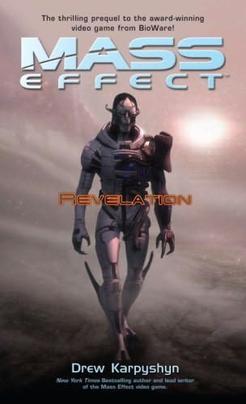
Mass Effect: Revelation is a science fiction novel by Drew Karpyshyn, who was the lead writer of the Mass Effect series. Published in 2007 by Del Rey Books, it is the first novel set in the Mass Effect universe, and the prequel to the Mass Effect video game by BioWare.
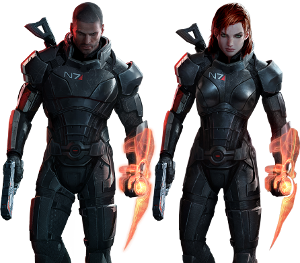
Commander Shepard is the player character in the Mass Effect video game series by BioWare.

The Reapers are a fictional fleet of sentient starships that serve as the main antagonists of the Mass Effect trilogy. The design of the Reapers was inspired by H. P. Lovecraft's Cthulhu Mythos deities. Within the series, the Reapers cause galactic-level mass extinctions every fifty-thousand years. The Reapers and their technology are capable of brainwashing organic life through a mind control process called indoctrination. The Reapers employ servants who are often altered into synthetic-organic life forms.

Mass Effect 2 is an action role-playing video game developed by BioWare and published by Microsoft Game Studios and Electronic Arts for Windows and Xbox 360 in 2010 and published by Electronic Arts for PlayStation 3 in 2011. It is the second installment in the Mass Effect series and a sequel to the original Mass Effect. The game takes place within the Milky Way galaxy during the 22nd century, where humanity is threatened by an insectoid alien race known as the Collectors. The player assumes the role of Commander Shepard, an elite human soldier who must assemble and gain the loyalty of a diverse team to stop the Collectors in a suicide mission. Using a completed saved game of its predecessor, the player can impact the game's story in numerous ways.

Mass Effect: Ascension is a science fiction novel by author Drew Karpyshyn. It is a sequel to the video game Mass Effect, as well as to its prequel novel, Mass Effect: Revelation, also written by Karpyshyn. The novel is set approximately two months after the ending events of the first game. While the first book acted as a prequel to the first game, Ascension helps to bridge the gap between the first game and Mass Effect 2.
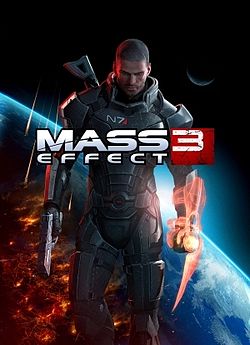
Mass Effect 3 is a 2012 action role-playing video game developed by BioWare and published by Electronic Arts. The third major entry in the Mass Effect series and the final installment of the original trilogy, it was released in March 2012 for Microsoft Windows, Xbox 360, and PlayStation 3. A Wii U version of the game, entitled Mass Effect 3: Special Edition, was later released in November 2012. The game is set within the Milky Way galaxy in 2186, where galactic civilization is invaded by a highly advanced machine race of synthetic-organic starships known as Reapers.
Mass Effect is a military science fiction media franchise created by Casey Hudson. The franchise depicts a distant future where humanity and several alien civilizations have colonized the galaxy using technology left behind by advanced precursor civilizations.

Mass Effect: Redemption is a four-part comic book mini-series. Set in the Mass Effect universe, Redemption takes place two years before the events of the video game Mass Effect 2.
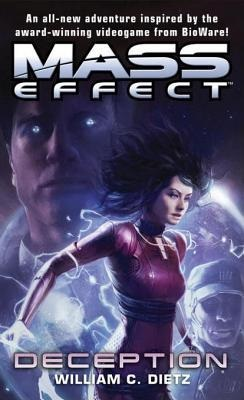
Mass Effect: Deception is a novel by writer William C. Dietz set in the Mass Effect universe. Published in 2012 by Del Rey Books, it is the fourth novel set in the Mass Effect universe, and continues the story of the previous three novels. Deception is notable for the negative reception from fans of the Mass Effect series, which prompted significant coverage from media outlets. In response to the negative reception, BioWare announced in February 2012 that they intended to revise the novel's content for future editions of Deception. No rewrite has been announced or published ever since.

The Illusive Man is a fictional character in BioWare's Mass Effect video game franchise. He is the leader of the pro-human group Cerberus. The Illusive Man wears an open suit that connotes both futuristic style and the "casual swagger of a charming billionaire". His eye implants make him appear slightly inhuman. He is normally seen in an empty office with no indication of his living arrangements. He is voiced by Martin Sheen.
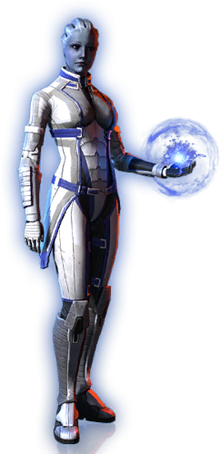
Dr. Liara T'Soni is a fictional character in BioWare's Mass Effect franchise, who serves as a party member in the original Mass Effect trilogy. She is an asari, a female-appearing species from the planet Thessia who are naturally inclined towards biotics, the ability to "manipulate dark energy and create mass effect fields through the use of electrical impulses from the brain". Within the series, Liara is noted for being the galactic scientific community's foremost expert in the field of Prothean archaeology and technology, specifically evidence concerning the demise of the ancient Protheans, believed by the galactic community to be the pre-eminent civilization in the Milky Way galaxy until their sudden disappearance fifty thousands years before the events of the first Mass Effect.

Archetype Entertainment is an American video game development studio established as a division of game developer and publisher Wizards of the Coast, itself a subsidiary of Hasbro. The Austin, Texas-based studio was created by Wizards in April 2019 to develop new intellectual property outside of Wizards' existing Dungeons & Dragons and Magic: The Gathering franchises. Archetype is notable for having drawn talent previously fired from BioWare, due to poor business performance of titles directly under their control; Studio Head, James Ohlen, who had previously worked on Dungeons & Dragons role-playing games such as the Baldur's Gate series among other titles along with Chad Robertson and Drew Karpyshyn.

Mass Effect 3: Omega is a major downloadable content (DLC) pack developed by BioWare and published by Electronic Arts for the 2012 action role-playing video game Mass Effect 3. It was released for Microsoft Windows, PlayStation 3, and Xbox 360 on November 27, 2012, with a delayed release in Europe on the PlayStation 3 platform set for November 28, 2012. The pack follows Commander Shepard and the asari pirate queen Aria T'Loak as they attempt to liberate the space station Omega from the anthropocentric terrorist group Cerberus. Omega expanded beyond the developers' original plan during its development cycle, both in response to a mandate of freedom by BioWare management and as a result of the development team's desire to develop the experience they wanted, and incorporates cut content from the main game.
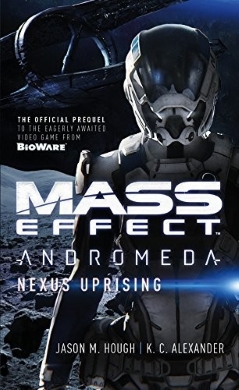
The Mass Effect: Andromeda book series consists of a trilogy of science fiction novels based on the Mass Effect series of video games. The books in the series are Nexus Uprising (2017), Initiation (2017), and Annihilation (2018). All three books are released in paperback, e-book, and audiobook. The audiobook formats of Nexus Uprising and Initiation are narrated by Fryda Wolff, the voice of Sara Ryder, while the Annihilation audiobook is narrated by Tom Taylorson, the voice of Scott Ryder.

The Normandy-class SR are two fictional spacecraft in the Mass Effect video game franchise. She first appears in Mass Effect as the SSV Normandy SR-1, the product of a joint venture between the human Systems Alliance and the Turian Hierarchy, and described as the most advanced military stealth starship in the galaxy within the series. An improved version of the ship known as the Normandy SR-2, though no longer a commissioned spaceship of the Alliance Navy, is later constructed by the anthropocentric paramilitary organization Cerberus and appears from Mass Effect 2 onwards. Both iterations of Normandy have Jeff "Joker" Moreau as the pilot in command, while the SR-2 is integrated with an artificial intelligence entity known as EDI. She functions as the primary means of transport and base of operations for the player, in the role of Spectre Commander Shepard, and their crew, as they travel throughout the Milky Way and fight hostile aliens such as the Reapers.

The Mass Effect media franchise, developed by BioWare and published by Electronic Arts, is set in the distant future where various extraterrestrial species coexist with humanity. The developers created extensive background lore for the universe of Mass Effect and its alien species, with detailed explanations documenting the complex relationships between the universe's various factions and the setting's phenomena from a scientific perspective. The developers were inspired and influenced by numerous fantasy and science fiction works, as well as real world cultural and scientific concepts. Dark energy, a form of energy theorized to massively affect the universe, forms a key part of the franchise's concept and background.
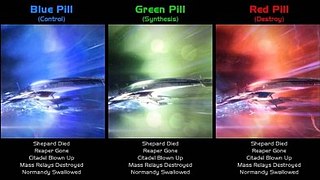
Mass Effect 3 is an action role-playing video game and the third installment of the Mass Effect video game series, developed by BioWare and published by Electronic Arts (EA). Upon its release March 6, 2012 for the PlayStation 3, Xbox 360, and Microsoft Windows, Mass Effect 3 generated controversy when its ending was poorly received by players who felt that it did not meet their expectations. Criticisms included the ending rendering character choices inconsequential, a general lack of closure, plot holes, and narrative inconsistency.















